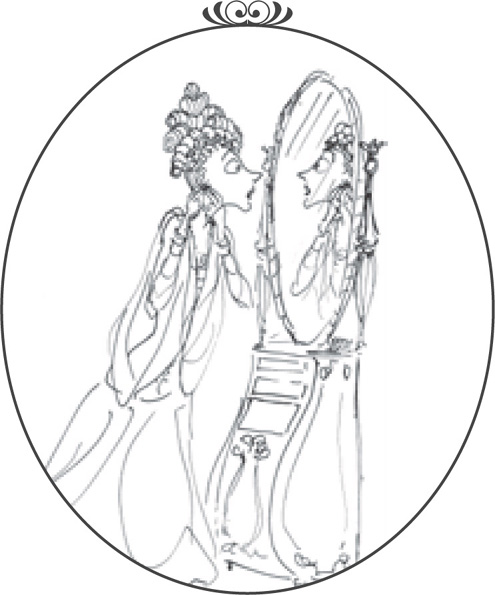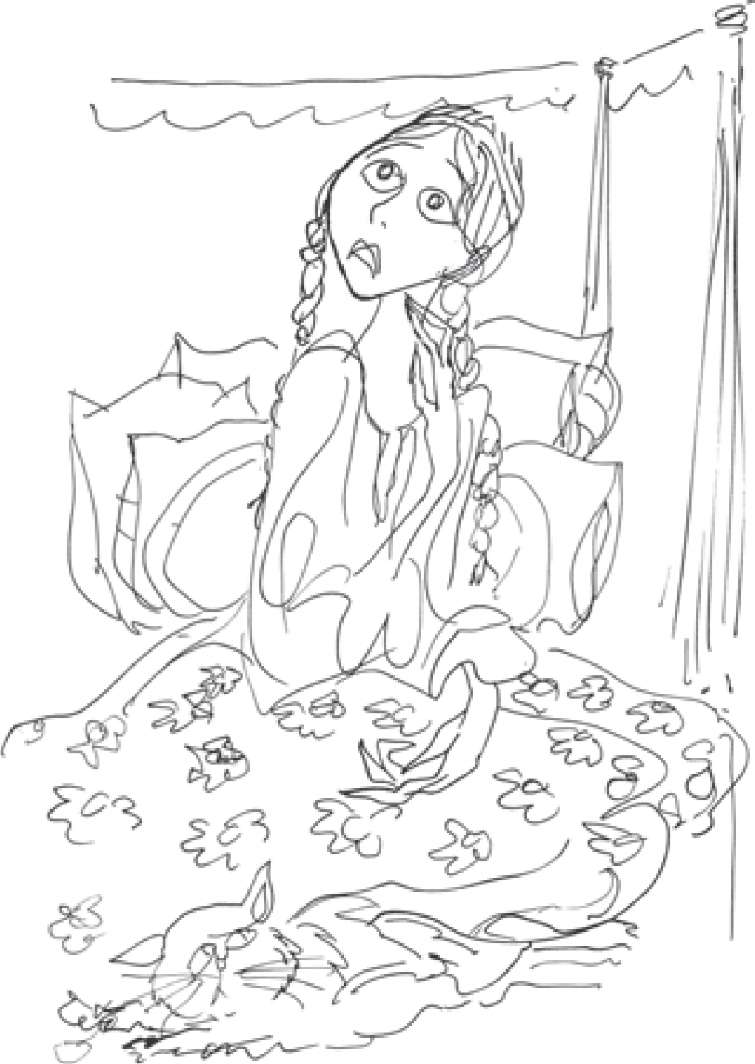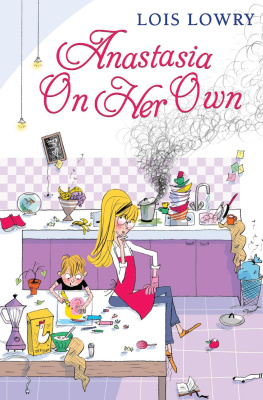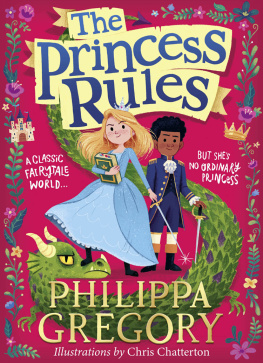
Illustrations by Jules Feiffer
Houghton Mifflin Books for Children
H OUGHTON M IFFLIN H ARCOURT
B OSTON N EW Y ORK 2010
Text copyright 2010 by Lois Lowry
Illustrations copyright 2010 by Jules Feiffer
All rights reserved. For information about permission
to reproduce selections from this book, write to
Permissions, Houghton Mifflin Harcourt Publishing Company,
215 Park Avenue South, New York, New York 10003.
Houghton Mifflin Books for Children is an imprint of
Houghton Mifflin Harcourt Publishing Company.
www.hmhbooks.com
The text of this book is set in Youbee.
The illustrations are pen and ink.
Library of Congress Cataloging-in-Publication Data
Lowry, Lois.
Birthday ball / by Lois Lowry ; illustrated by Jules Feiffer.
p. cm.
Summary: When a bored Princess Patricia Priscilla makes her chambermaid
switch identities with her so she can attend the village school, her attitude
changes and she plans a new way to celebrate her sixteenth birthday.
ISBN 978-0-547-23869-2
[1. PrincessesFiction. 2. BirthdaysFiction. 3. Schools
Fiction. 4. Conduct of lifeFiction.] I. Feiffer, Jules, ill.
II. Title.
PZ7.L9673Bi 2010
[Fic]dc22
2009032966
Manufactured in the United States of America
DOC 10 9 8 7 6 5 4 3 2 1
4500215868
To Will and Sophie Clark,
and the librarians in their lives.
1. The Princess
When Princess Patricia Priscilla woke on the morning of the day that was five days before her birthday, her first thoughts were not Oh, I am almost another year older, hardly a child anymore! or I wonder what fabulous gifts will be presented to me at the Birthday Ball six nights from now!
No. Her thoughts were Bored, bored, bored.
The princess blinked, then sat up against the seven silk-covered pillows (in seven subtly different shades of royal colors ranging from the palest lavender to the richest purple) that were strewn across the head of her magnificent carved hickory poplar bed.

She snapped her fingers to awaken her yellow long-haired cat, who was still sound asleep near her feet. Delicious opened one amber eye and yawned, showing pointed, highly polished teeth, and then extended four sets of claws in a morning stretch. The cat stabbed at one of the embroidered sunflowers on the elaborate bedcover and pulled one thread loose and then another.
"Please don't be so vicious, Delicious," the princess said in a mildly scolding voice. "It makes me yearn to have a sunflower to tear apart myself. I'm so terribly bored."
The cat looked up and narrowed her eyes to glittery slits. The princess read her mind. She was thinking, in a commanding kind of think: Feed me.
"All right," the princess said. She reached for the thick golden bell cord that hung beside the bed, and pulled at it. Then she made an affectionate kissing sound toward her cat and pulled a second, smaller bell cord that dangled beside the first.
Immediately, many levels below in the tall castle, things began to happen.
Three floors down, in the bell room, an antechamber to the basement kitchen of the castle, the two bells rang. One was a dainty brass bell with a pleasant, melodic tinkle, and the other was a small tin one that simply clinked. The bell boy, a young village lad new to the job, was crouched on the floor of the bell room, playing with a shabby set of dominoes. When he heard the small sounds, he looked up at the bell board. He could not read. But beside each bell was a carefully delineated outline.
He saw the small brass bell, which was still vibrating, and beside it the silhouette of a young woman with ringlets and a crown.
"Princess!" he called out, as his job required.
Below it, he looked at the tin bell and its corresponding long-tailed silhouette.
"And cat!" he shouted.
Then he returned to his dominoes, which he was arranging in a line.
In the next room, a chilly stone-floored chamber where food was stored on long tables, an aproned woman with gray disheveled hair was arranging cupcakes in rows.
"Princess and cat!" she called toward the main kitchen.
"Princess, aye!" called three kitchen maids, identical triplets, in three-part harmony. The harmony was not a requirement of their job, but they had been working on it, hoping to advance in a musical direction that would eventually take them out of the damp, cheerless kitchen. One, the soprano, immediately cracked two eggs into a pan in which butter was already sizzling, on the top of the huge castle stove. Another, a mezzo-soprano, with practiced motion, poured milk into a silver pitcher. The third, the alto, still humming, set a tray on the table and placed on it a small vase holding several flowers picked only minutes before from the castle garden.
"Cat, aye!" grumbled a serving boy. He was elderly, close to eighty. Once he had been a butler, a much more important job, but he had recently been demoted to serving boy (even worse, serving boy in charge of house animals!) after an arthritic hip had caused him to stumble in the dining room and spill hot chocolate on the queen's taffeta skirt. He resented his job and especially his titleserving boy, indeed!but there was nothing to be done, because he did not wish to retire and stay home with his ill-tempered wife in the small cottage that resounded with her scolds and complaints. He rose with a small groan, holding his hip, from the place he'd been sitting, and shuffled to the side table where two dozen sardines had been laid out on a large tin plate. He peered at them carefully and selected four of the lesser sardines, the ones with the glisten that was not quite as bright (and one with a ragged tear in its tail end), which he placed in the bowl marked DELICIOUS. The other bowls, marked with the names of other housecats, were still empty and waiting, their meals having not yet been summoned.
The elderly serving boy placed the bowl of sardines on the tray just as the soprano maid, with a little trill as she rehearsed some high notes she'd been having trouble with, slid the two cooked eggs onto a plate and set it beside the flower vase and the milk pitcher.
"Pulley Boy!" the serving boy called, and hobbled back to his rocking chair.
The bell boy's older brother rose from the chair where he'd been half dozing, half watching the dominoes, and ran to the kitchen to collect the tray. He had been selected for the job because of his speed. Four village boys had applied. But he was quickest on his feet.
The pulley boy ran, the tray so steady on his hands that not a drop of milk appeared over the lip of the little pitcher, into the long hall lined with seventeen square wooden doors, each painted with a silhouette just above its latch. Because he was accustomed to his job, the pulley boy no longer had to examine the silhouettes. He went immediately to the door designated for the princess's bedchamber. He lifted the latch, opened the door, placed the tray onto the wooden shelf suspended within, and pulled the thick rope, which lifted it three floors above so quickly that the eggs did not cool.
"Princess and cat aloft!" he called loudly while the tray rose through the thick walls.
"Princess and cat aloft, aye," the entire population of the castle kitchen murmured, heads nodding, and went back to their work. The pulley boy settled again in his chair. His younger brother, the bell boy, set the last domino carefully on edge, then tapped it and watched the line collapse. He clapped his hands in delight. At the same time, he remained alert, listening, waiting for the next bell to ring, for that was his job.
Next page














